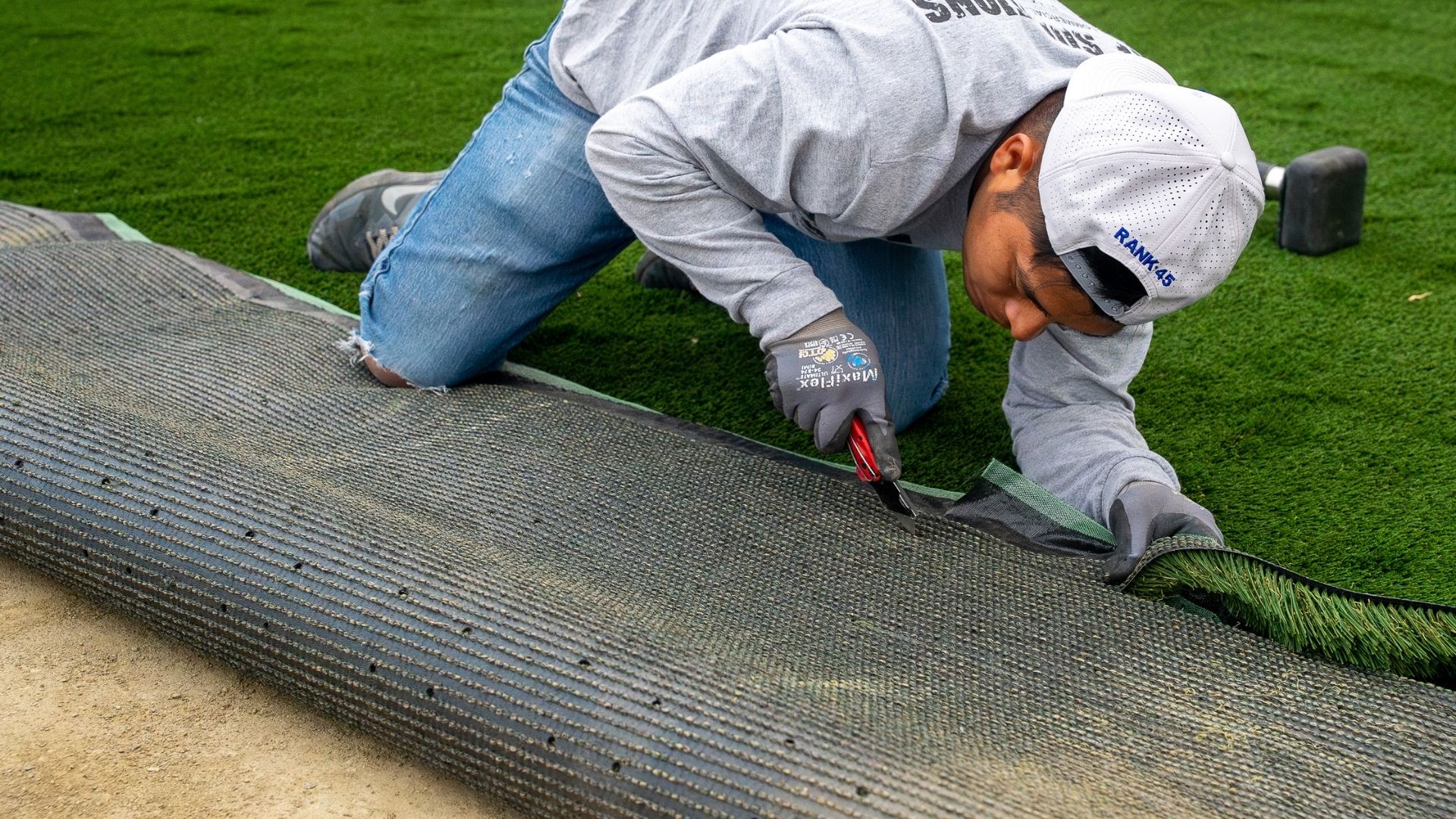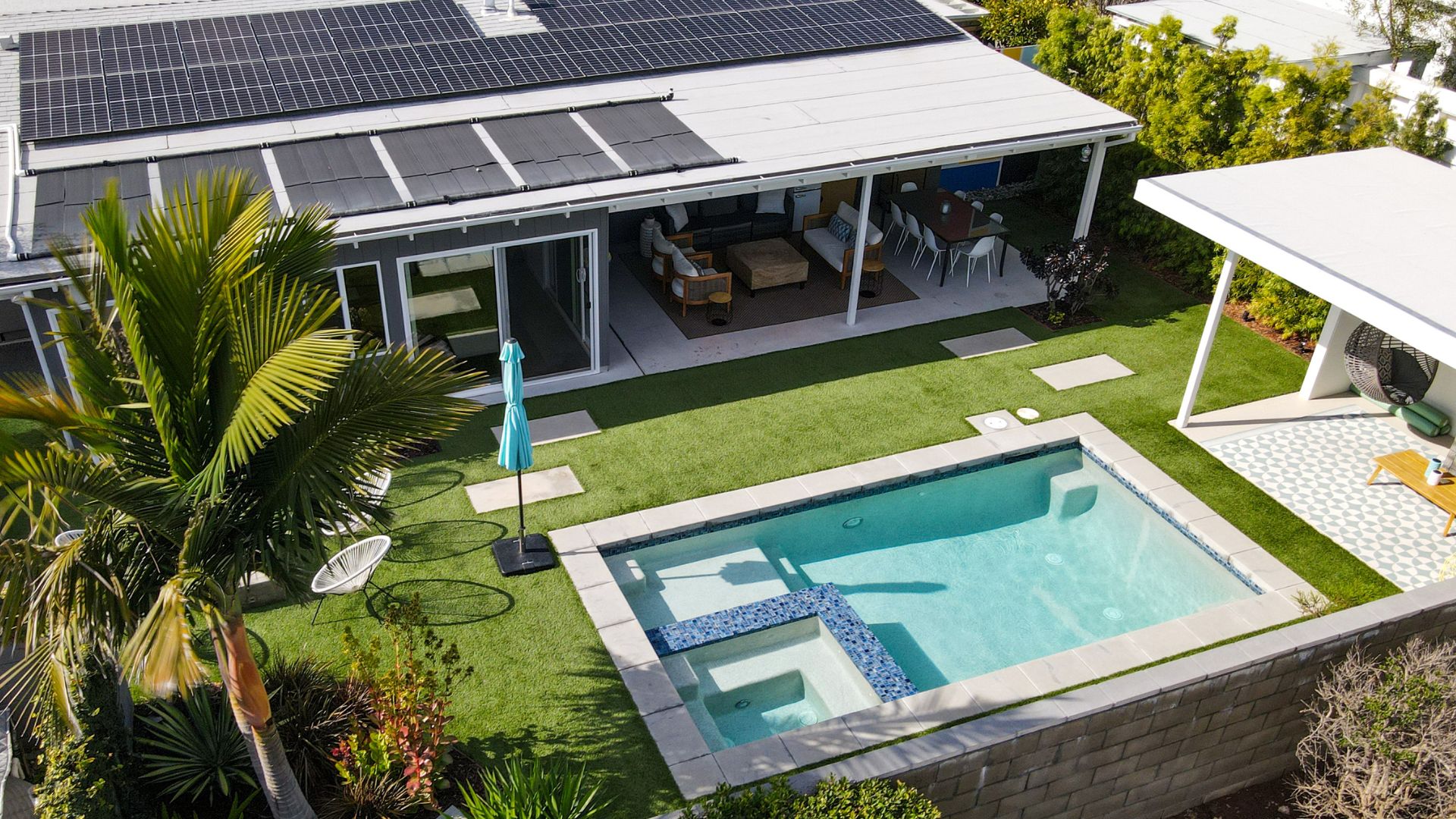Here’s something I didn’t know before I worked in this industry: artificial grass can melt. Okay, so I’ve never actually seen someone’s synthetic turf become a solid sheet of green plastic. But too much sustained direct heat does make many types of turf lose their color, texture and lifespan. So, how do you get artificial grass that doesn’t get hot? Minimizing the impact of heat ultimately boils down to buying high-quality turf of the right material and color, then knowing which infills and lawn care habits reduce the impact of heat.
Guide to Artificial Grass That Doesn’t Get Hot
-
- Choose lighter-colored artificial grass with heat-resistant technology
- Use cooling infill materials like Envirofill or HydroChill
- Install proper drainage and shock-absorbing underlayment
- Create shade with trees, awnings, or shade sails
- Regularly rinse your turf with water to cool it down
The Hot Topic: Why Artificial Grass Heats Up
Before we discuss solutions, we need to understand the problem. So, what makes artificial grass get so hot? And here we need to contrast it with natural grass, which has a built-in cooling system thanks to transpiration (plant sweat, basically). That moisture evaporates, taking some heat with it. But artificial turf is made of plastic and rubber (no sweating!). And we all know what happens when you leave plastic in the sun – it gets hot enough to fry an egg!
And those high temperatures (sometimes reaching as high as 160-180°F — YIKES!) can be dangerously uncomfortably for bare feet and paws. And they just contribute to a hotter outdoor living experience and can damage your artificial grass.
But I come with insights and solutions, friends. So let’s get started.
1. Choose Your Turf Wisely: The Cool Kid on the Block
So you want artificial grass that doesn’t get hot? Then start by buying the right turf. And buying the right lawn product is all about 3 synthetic turf properties: color, heat-resistant technology, and the turf’s face weight.
Go Light or Go Home
This first suggestion for choosing artificial grass that doesn’t get hot might surprise you: choose a lighter shade of green. Just like how you avoid wearing black on a sunny day, lighter-colored turf reflects more sunlight and absorbs less heat. It’s just plain science!
Technology to the Rescue
Next, you’ll want to look for artificial grass with heat-resistant technology. For example, our 70t Lawn & Landscape turf is developed using UV inhibitor and stabilizers to resist the effects of ultraviolet degradation and heat. It’s one of our top-selling and top-performing lawn solutions for a reason.
If you have questions about the best heat-busting artificial grass for your landscaping project, give the experienced Artificial Turf Supply team a call: (866) 677-9405
We’d be happy to help you find the perfect turf or get you a free quote!
Face Weight Matters
Here’s another artificial grass insight that surprised me: turf with a lighter face weight (that’s turf-speak for density) tends to stay cooler. It’s like the difference between wearing a thick wool sweater and a breezy linen shirt on a hot day.
2. Infill: The Secret Sauce of Cool Turf
The second way to choose artificial grass that doesn’t get hot is to implement the right infill. Infill is a material made of small particles that’s spread throughout your turf, and it’s not just there to make your grass stand up straight and look pretty. It can also play a huge role in temperature control.
Sand is Your Friend
Silica sand is a popular infill choice for good reason. It’s fairly inexpensive and does its primary job pretty well. It also doesn’t retain heat like those pesky rubber crumbs do. So while I wouldn’t say this is your best heat-reducing option, it’s not making the problem worse, either.
Envirofill: The All-in-One Wonder
For shoppers looking for artificial grass that doesn’t get hot, Envirofill is our first recommendation. It’s not your cheapest option, but it really does bring a lot of value to your lawn.
It’s made from naturally-occurring silica sand from right here in the USA, and it’s been proven to lower the surface temperature of your artificial lawn by up to 25%. Plus, its developed with Microban® antimicrobial technology that prevents the growth of bacteria, mold, and mildew. This helps fight odors and stains (big if you have kids or pets). And for all of you eco-conscious shoppers, Envirofill is non-toxic, eco-friendly, and completely reusable. Yep, it’s cool, clean, and practically maintenance-free.
Other Unique Heat-Beating Infill Options
Envirofill isn’t the only infill option that’s specifically designed to beat the heat. ZeoFill® is made from volcanic mineral that naturally holds onto moisture, slowly releasing it through evaporation to keep turf cool. HydroChill is another infill solution that works in a similar fashion.
You just have to find the best solution that fits your goals for your lawn. I can’t recommend Envirofill enough.
3. Installation Matters: Building a Cool Foundation
Artificial turf’s beauty and performance is directly reliant on how well it’s installed. If you buy artificial grass that doesn’t get hot, but then don’t install your turf properly, it won’t turn out well. Modern artificial grass has come a long way, and it has layers of landscaping technology working together. Make sure you understand how to install synthetic turf the right way, and please consult with professionals before you make any purchases or break any ground.
Our team of synthetic turf pros is just a phone call away: (866) 677-9405
Drainage is Key
Proper drainage isn’t just about preventing puddles (though that is important because no one wants mold or mildew). Drainage also helps with temperature control. A well-drained base allows water to sift through, which also has a cooling effect from below.
Shock Pad: Not Just for Sports
This might be an unexpected suggestion to keep your turf cool: consider installing a shock-absorbing pad underneath your turf. Usually these pads are installed for athletic turf applications, but it can have a heat-reducing use, as swell. First of all, it can help give your lawn that natural-grass springiness, but it also acts as an insulator, keeping any heat from the ground from transferring up to your turf. As you can imagine, this suggestion is most useful for climates where the ground holds a lot of heat.
4. Shade: Nature’s Air Conditioning
If you want artificial grass that doesn’t get hot from the sun, reduce the amount of direct sunlight. Easy to say, but sometimes more difficul to accomplish, depending on the layout of your outdoor space.
Tree-t Your Turf Right
I love sitting under a big shady tree on a hot day, and so will your artificial grass. If you’ve got trees in your yard, use them! And you can also plant some strategically to provide shade for your turf during the hottest parts of the day. It’s like giving your lawn its own personal umbrella. And speaking of umbrellas…
Man-Made Shade to the Rescue
No trees? No problem! Bring in some patio umbrellas, shade sails, pergolas, or awnings to create those heat-reducing shaded areas. And the great thing with these solutions is twofold: it keeps your turf cool, but also creates a comfortable, relaxing spot to sit back with a cold drink. This is next level outdoor living!
5. Water: The Ultimate Cooldown
“Spray some water on the thing that’s hot” is definitely one of those “so simple it should be obvious” solutions. But at the same time, not having to water your lawn is one of the selling points of artificial grass, so I can understand any confusion. And here’s the thing — not only does a little H2O go a long way to cool your turf, there are actually a few great reasons to water your synthetic lawn. Hosing down your artificial grass keeps it looking and smelling beautifully fresh for longer.
And you have a number of easy, effective ways to cool your fake lawn with a quick shower.
The Quick Spritz
We’ll start with the lo-tech option: grab a hose. On those scorching hot days, a quick spray-down can help your artificial grass a lot. It will instantly drop your lawn’s temperature, plus it helps clean your turf a bit.
Misting Systems: The Fancy Option
Misting systems are another great option. There’s definitely some up-front setup or budgeting to consider, but a misting system means you don’t have to stand in the heat with a hose. And just like installing outdoor shade like patio umbrellas or pergolas, the misting system is a great way to cool off your humans in the dead of summer.
6. Maintenance: Keep It Clean, Keep It Cool
And our final tip for artificial grass that doesn’t get hot? Regular turf maintenance. I know, I know, you got artificial turf to avoid maintenance, but hear me out. These few simple steps helps you keep your lawn cooler, but also just helps it look better for longer.
-
- Brush It Off: regular brushing of your turf helps prevent compaction and allows for better air circulation. And air circulation = cooler temps!
- Rinse and Repeat: set a schedule to rinse your turf regularly, especially if you’ve got pets. This helps with both temperature and odors.
The Cool Conclusion
That’s the low-down on artificial grass that doesn’t get hot. We know artificial turf can get warmer than natural grass, but the right turf product choices and practices will help keep your lawn cool and comfy, even in the hottest summer days.










